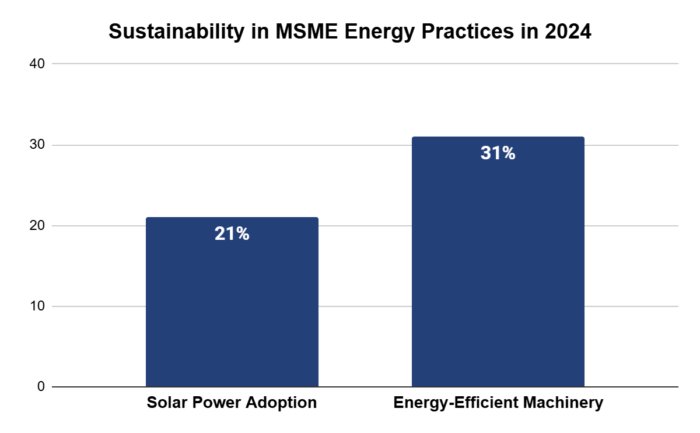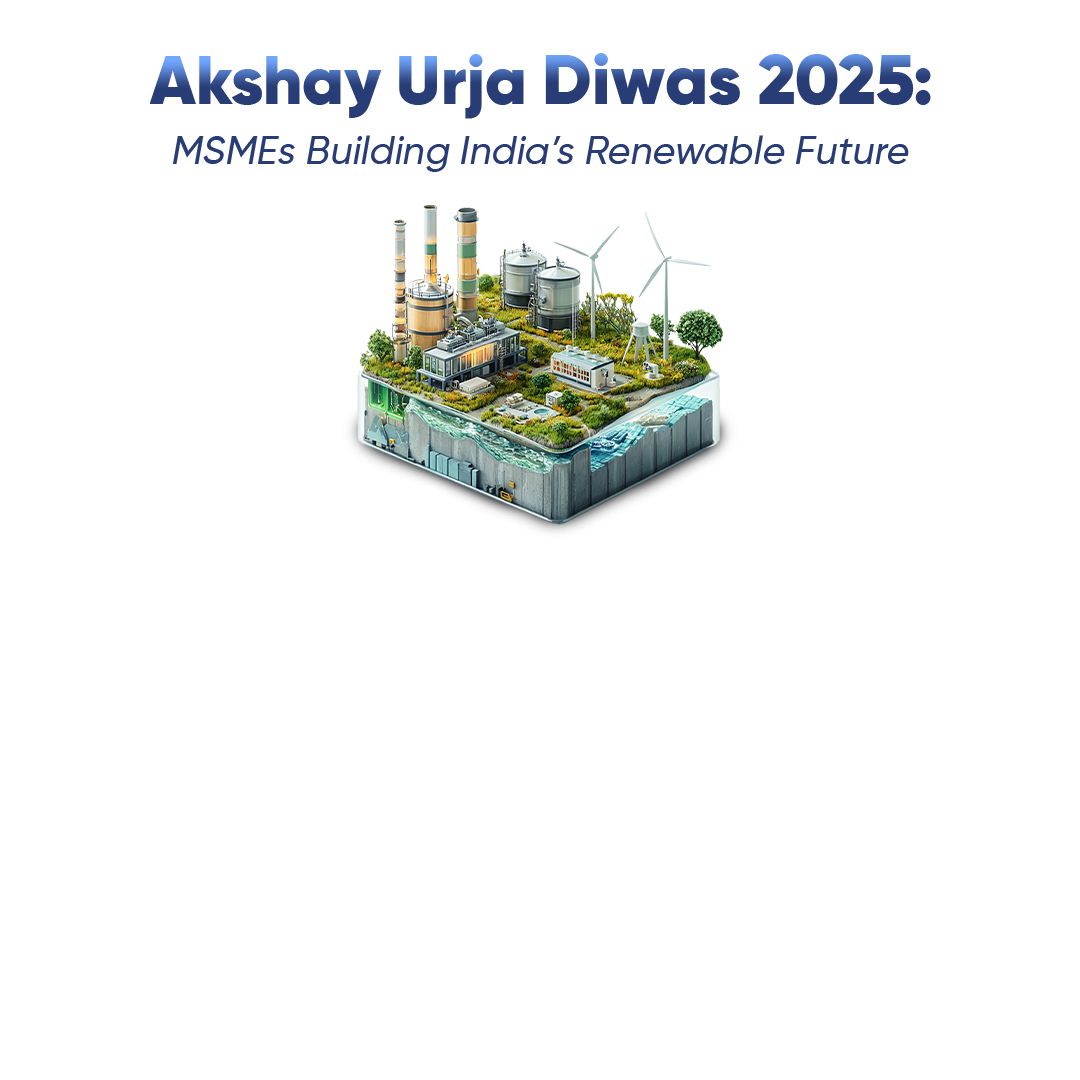Akshay Urja Diwas 2025: MSMEs Building India’s Renewable Future
- India has set a goal of achieving Net Zero emissions by 2070 and building 500 gigawatts (GW) of non-fossil fuel capacity by 2030. MSMEs play a pivotal role in this ambition. However, their energy footprint stands at a high 110 million tons of carbon dioxide (CO₂) emissions and nearly 50 million tons of oil consumption annually.
- The energy consumption is projected to increase by nearly 50% by 2030, and leaving it unaddressed will raise operational expenses of MSMEs, preventing India from meeting sustainability standards.
- Their transition towards smarter energy consumption can improve productivity, reduce emissions, and secure their place in India’s renewable future. The sector is making strides in this direction, with nearly 21% adopting solar power and 31% introducing energy-efficient machinery into their operations
India has set ambitious targets for its energy future, pledging to achieve Net Zero emissions by 2070 and build 500 gigawatts (GW) of non-fossil fuel capacity by 2030. These commitments signal a structural transformation in how industries, cities, and rural regions will function in the decades ahead. While large corporations and state-led projects are often at the forefront of discussions around renewable energy, the role of MSMEs is equally significant, as the sector constitutes a large portion of the business.
Yet, the energy footprint of MSMEs poses a challenge. Collectively, the sector emits around 110 million tons of carbon dioxide (CO₂) annually and consumes nearly 50 million tons of oil equivalent every year1. Despite this heavy usage, the outcomes remain inadequately efficient, as MSMEs are only 26% as productive as large enterprises, compared to 29% in other emerging economies2.
This imbalance highlights that MSMEs are consuming more because they produce less efficiently. The result is higher manufacturing and storage costs, squeezed margins, resulting in limited competitiveness. The challenge is compounded by the fact that MSMEs’ energy consumption is projected to increase by nearly 50% by 20303. Unless addressed, this will raise operational expenses and undermine India’s ability to meet environmental sustainability standards.
Hence, as the nation observes Akshay Urja Diwas on 20 August 2025, we focus on how MSMEs can transition toward smarter energy consumption—improving productivity, reducing emissions, and securing their place as central players in India’s renewable future. The sector is already making strides in that direction.
Sustainability in MSME Energy Practices
By 2024, nearly 21% of MSMEs in India had adopted solar power, while around 31% had introduced energy-efficient machinery into their operations. The cumulative capacity of rooftop solar installations reached 11.87 GW, helping businesses cut electricity expenses by an average of 30%. This transition holds the potential to reduce carbon dioxide emissions by about 110 million tonnes annually. The momentum is particularly visible in energy-intensive sectors such as textiles and chemicals, with states like Gujarat, Maharashtra, and Kerala emerging as frontrunners in this green shift4.

Export markets, particularly in Europe and North America, are demanding sustainable production from suppliers. MSMEs that use renewable energy or recycled materials often find themselves preferred in global supply chains. For instance, manufacturers who use energy-efficient machines, handicraft exporters who use solar-powered workshops, or recycled inputs meet international buyers’ expectations for sustainability standards, enhancing their growth prospects.
Domestically, too, consumer preferences are shifting. Customers in cities and smaller towns are showing willingness to pay for eco-friendly practices, whether in textiles, packaging, or personal care. MSMEs adopting green practices are thus positioning themselves for long-term relevance.
MSMEs in the Renewable Energy Value Chain
MSMEs contribute to manufacturing by producing solar panels, inverters, and parts for small wind turbines and biomass systems. These enterprises often supply larger renewable firms that need cost-competitive and flexible suppliers. Clusters in Gujarat, Tamil Nadu, and Maharashtra, for example, have emerged as strong manufacturing bases for solar and wind components.
In services, MSMEs play a vital role in installation, repair, and long-term operation and maintenance (O&M). Renewable systems such as rooftop solar panels or micro-grids require continuous monitoring and upkeep. Local MSMEs provide this support, ensuring reliability and building trust among households and small businesses adopting green energy.
MSMEs are also critical in renewable supply chains. Large energy companies rely on smaller firms to provide raw materials, fabrication services, and customized parts. Their ability to adapt quickly to demand fluctuations makes them invaluable in a sector where growth is rapid and evolving.
MSMEs as Enablers of Energy Access
Despite MSMEs’ integral role, energy access remains a challenge for many small businesses in semi-urban and rural parts of India due to frequent power shortages, unreliable supply, and high costs. Renewable energy solutions offer a pathway to bridge this gap, and MSMEs are taking the lead in delivering them.
Small enterprises are setting up decentralized projects such as solar home systems, rural mini-grids, and community biogas plants. Their proximity to local consumers allows them to provide not only installation but also training and after-sales services. For example, MSME-led solar firms in tier-3 cities are helping schools, small health centers, and households access uninterrupted electricity at affordable rates.
Biogas units, promoted under the Ministry of New and Renewable Energy’s (MNRE) biogas program, have created a niche market for MSMEs that specialize in design, construction, and maintenance. Similarly, local enterprises managing solar mini-grids have enabled communities to move away from costly diesel generators, reducing both expenses and emissions.
By combining affordability with accessibility, MSMEs are emerging as last-mile champions of energy inclusion. Their role ensures that India’s renewable transition does not remain limited to large cities or industrial users but reaches smaller towns and villages as well.
Opportunities Driving MSME Participation
The growing presence of MSMEs in the renewable and green economy is supported by multiple drivers.
- Expanding demand base: Corporates aiming to meet sustainability targets are increasingly sourcing from green suppliers. Households are embracing rooftop solar, energy-efficient appliances, and EV-based logistics. This surge in demand is creating diverse markets that MSMEs can serve profitably.
- Technology transfer and collaboration: MSMEs are partnering with larger firms and research institutions to access renewable technologies at affordable costs. This allows them to adapt advanced innovations, such as battery management systems or efficient solar modules, without incurring high R&D expenses.
- Policy environment: With India committing to long-term renewable targets, MSMEs can confidently build their capabilities knowing that demand will remain strong. Clear policy signals reduce uncertainty and encourage investment.
These drivers collectively create a fertile ground for MSMEs to expand their presence in the renewable landscape.
Supporting Structures in Finance, Policy, and Programs
While opportunities are vast, MSMEs continue to face barriers in financing and scaling their renewable efforts. Addressing these challenges requires strong institutional support, which is being fulfilled with:
- IREDA Lending: The Indian Renewable Energy Development Agency (IREDA) has reported significant growth in renewable energy financing. In FY 2024–25, loan sanctions rose by 27% from ₹37,354 crore to ₹47,453 crore, loan disbursements increased 20%, from ₹25,089 to ₹30,168 crore, and the outstanding loan book expanded 28%, from ₹59,698 crore to ₹76,250 crore compared to the previous year5.
Of this loan portfolio in renewables, MSMEs accounted for 2%, which the organization is ramping up.
- Government Schemes: The Grid-Connected Rooftop Solar Program offers subsidies for rooftop installations. The Raising and Accelerating MSME Performance (RAMP) scheme, launched in 2022, supports competitiveness upgrades. Meanwhile, the Zero Defect Zero Effect (ZED) Certification has recognized more than 27,000 MSMEs for quality and green practices.
- Regulatory Frameworks: The Reserve Bank of India’s 2024 framework for green deposits and lending is pushing financial institutions to create specialized credit products for sustainable projects (RBI, 2023: link). Likewise, the SEBI has eased ESG disclosure rules for MSMEs linked to listed firms, reducing compliance costs while encouraging sustainability.
- Cluster level Programs: Initiatives such as Simplified Digital Hands-on Information on Energy Efficiency (SIDHIEE), supported by the Bureau of Energy Efficiency (BEE), United Nations Industrial Development Organization (UNIDO), and Global Environment Facility (GEF), have implemented renewable and energy-efficiency projects across more than 1,100 MSMEs in industrial clusters6. These projects demonstrate how collective participation can deliver both cost savings and sustainability gains.
Private financial institutions and RBI-registered NBFCs, such as Protium, are also stepping in to support MSMEs seeking to upgrade to energy-efficient machinery or adopt renewable energy practices. By offering flexible, MSME-focused credit products, these lenders are bridging the financing gap that often prevents small businesses from investing in green transformation.
Such support structures are laying the foundation for MSMEs to participate in the green transition effectively. While financing remains a critical requirement, skill development and research collaboration are equally important. MSMEs need training in renewable technologies, quality standards, and energy management. Partnerships with vocational institutes and industry associations can provide targeted skilling in areas such as solar installation, battery technology, or energy auditing.
Finally, integration with global supply chains holds immense potential. With global demand for renewable components rising, Indian MSMEs can position themselves as competitive suppliers if they align with international standards. This could make India not only self-reliant in green technologies but also a global hub for renewable manufacturing.

